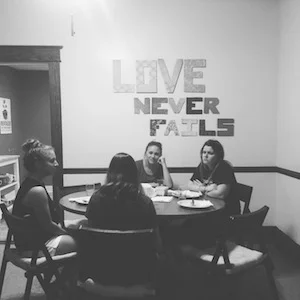 I listen for what I can affirm. I presume that people have treasured enthusiasms that are worthy of affirmation in some small way, and I try to find out what is it about the football game or even the legislation that seems to address a hope or a fear in that person. I start there and see where we can go. I do that in the classroom all the time, when I say something that leads a student to conclude that I’m not on their side. I try to provoke. I think everything I say I really believe, but I do try and direct it in such a way that it invites a sometimes passionate response, or at least that makes the person feel they must respond in order to be true to who they are. And once they do that, that’s not the end of the conversation. That’s the beginning of more questions.
I listen for what I can affirm. I presume that people have treasured enthusiasms that are worthy of affirmation in some small way, and I try to find out what is it about the football game or even the legislation that seems to address a hope or a fear in that person. I start there and see where we can go. I do that in the classroom all the time, when I say something that leads a student to conclude that I’m not on their side. I try to provoke. I think everything I say I really believe, but I do try and direct it in such a way that it invites a sometimes passionate response, or at least that makes the person feel they must respond in order to be true to who they are. And once they do that, that’s not the end of the conversation. That’s the beginning of more questions.
All in Vocation
 I want to live a contemplative life and, as an extension of that, to be a contemplative writer. I already tend toward that kind of life. I love thinking and getting into the deep space in my mind to explore and make connections. But getting into that space in a meaningful way can be difficult because it requires time and space. If there are no empty spaces for contemplation, there is no contemplation.
I want to live a contemplative life and, as an extension of that, to be a contemplative writer. I already tend toward that kind of life. I love thinking and getting into the deep space in my mind to explore and make connections. But getting into that space in a meaningful way can be difficult because it requires time and space. If there are no empty spaces for contemplation, there is no contemplation.
When a Dream Becomes a Life
Vocations are not occupations, though they are integrally woven together. To know the difference and the difference it makes is critical, and much of the grief we experience is borne of missing one for the other. Vocation is always the longer, deeper story of someone’s life; for Joy, she was always the creative creator of things she would make that the whole world would someday enjoy. Occupation is not that, but is more the way we describe the things we do along the way of life, entering into particular responsibilities and relationships that are ours, and while shaping and forming us, are more often than not signposts of the deeper vocation. They are not the point; they point to the point.
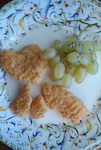 It’s not only that God shines out from orange slices and bookshelves. It’s that with grace, these things make love and goodness. These things—caring for these things, building and cleaning and keeping these things—make a place for the heart to rest and be cared for.
It’s not only that God shines out from orange slices and bookshelves. It’s that with grace, these things make love and goodness. These things—caring for these things, building and cleaning and keeping these things—make a place for the heart to rest and be cared for.
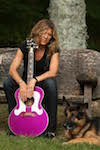 I am contemplative and introverted. I am tactile and love to make things. These are all catalysts for articulating my individuality. I am also an alcoholic, a drug addict, an egomaniac with an inferiority complex and an emotional lightning rod. These things do not supply my identity either, though they are as much a part of me as the traits I cherish. And I am equally grateful for them because the helplessness they triggered ushered me further into dependence on God and finding my place on the path, one step at a time.
I am contemplative and introverted. I am tactile and love to make things. These are all catalysts for articulating my individuality. I am also an alcoholic, a drug addict, an egomaniac with an inferiority complex and an emotional lightning rod. These things do not supply my identity either, though they are as much a part of me as the traits I cherish. And I am equally grateful for them because the helplessness they triggered ushered me further into dependence on God and finding my place on the path, one step at a time.
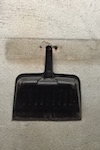 Like committing crummy jokes to memory, remembering is intentional, the discovery of great gain in contentment. Where the debris of spilled baggage reaches its angle of repose, the place where physical objects come to rest along an incline (to borrow from Wallace Stegner), there is rest from the near-constant onslaught of shame, of striving to be enough, to make ourselves worthy, to, in effect, make gods of ourselves. And maybe not being enough is a healthy place to be, a place where God is good and is enough, all the time.
Like committing crummy jokes to memory, remembering is intentional, the discovery of great gain in contentment. Where the debris of spilled baggage reaches its angle of repose, the place where physical objects come to rest along an incline (to borrow from Wallace Stegner), there is rest from the near-constant onslaught of shame, of striving to be enough, to make ourselves worthy, to, in effect, make gods of ourselves. And maybe not being enough is a healthy place to be, a place where God is good and is enough, all the time.
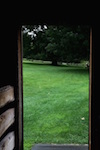 I think fiction writers do have something I lack. They must have the capacity to close their eyes, at least a little bit, to the world outside their window. With eyes half open they are free to imagine. Free to conjure whole worlds and lives. They are magicians as much as artists, and I am the grateful recipient of their magic.
I think fiction writers do have something I lack. They must have the capacity to close their eyes, at least a little bit, to the world outside their window. With eyes half open they are free to imagine. Free to conjure whole worlds and lives. They are magicians as much as artists, and I am the grateful recipient of their magic.
But I cannot close my eyes. Not even a little bit. I write nonfiction because so many memories are tapping at my window, there is no room left in my mind for any invention. I am wholly preoccupied observing and studying that which is already there.
Love Never Fails
We’re giving ourselves to these things, piece by very tiny piece. But before and amid all of that we’re giving ourselves to God and to each other. We’re relearning that we belong to each other already, that all things and people are connected. We’re creating space where we can remember who we are and whose we are — where we know we’re not alone.
In the Name of the Father
I did not know then nor do I know now the full nature of God. No one does, but we’re given glimpses through the revelation of nature, the testament of history and its saints, and especially through the ordinary people who love us and mark our days. As a child my earthly father represented whatever goodness, safety, and unconditional love there was to be found in this world. And that has everything to do with why I call myself a Christian today, and can still refer to God as Father, problematic though it may be for me as a 21st-century woman.
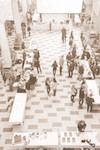 When I sat down last Friday night, I expected to hear an essay — fresh, different, perhaps unpublished — on one of his go-to topics, whether the environment, social justice concerns, or some other aspect of intentional living. Since the day I’d booked him, I’d been waiting for the moment when he’d take the stage and begin reading — his deeply rooted ethos already apparent, piercing — and then I would steal glances around the room to see the shock of recognition on the faces of my students, see the visible signs of narrative transport taking them to a new place with a master at the helm.
When I sat down last Friday night, I expected to hear an essay — fresh, different, perhaps unpublished — on one of his go-to topics, whether the environment, social justice concerns, or some other aspect of intentional living. Since the day I’d booked him, I’d been waiting for the moment when he’d take the stage and begin reading — his deeply rooted ethos already apparent, piercing — and then I would steal glances around the room to see the shock of recognition on the faces of my students, see the visible signs of narrative transport taking them to a new place with a master at the helm.
But something else happened. Not something bad, not less than . . . just different.
The Mother & Child Project
The role of the artist in society is unique. Unlike bankers, teachers, police officers, senators, doctors, or professors, artists stand at the margins of society and write poetry and prose rife with metaphor and images as a kind of prophetic voice, hopefully with a vision of truth and love. This vision can empower community, uplifting the vulnerable, and provide a newfound hope for a better life for all. The artist has the power to bend language to her will to get “between the lines” of poetry to allow what the Bible calls “true religion” to emerge. With this perspective, there is beauty, clarity, and pure advocacy.
 It was the hardest assignment I’ve ever been given. It had to be a certain length. It had to work musically with the tone of the visuals. It had to comment on what was going on onscreen without describing it, so it had to add subtext. I loved the challenge, and I’m still really happy with the final product. Auden claimed to have written a poem in every meter style that had ever existed. And if someone came up with one he hadn’t heard of before, he’d write it down and try to create a new poem in that meter. Pure craft, right?
It was the hardest assignment I’ve ever been given. It had to be a certain length. It had to work musically with the tone of the visuals. It had to comment on what was going on onscreen without describing it, so it had to add subtext. I loved the challenge, and I’m still really happy with the final product. Auden claimed to have written a poem in every meter style that had ever existed. And if someone came up with one he hadn’t heard of before, he’d write it down and try to create a new poem in that meter. Pure craft, right?
 I hold Jeanne’s book in one hand and Jill’s note in the other. It’d be nice to have them both here, but holding their words is nice, too. And I have the words that fill my bookshelves. Maybe someday my words will slowly settle again onto the page. Maybe I’ll unpack my life and see what makes it work like I did with the books I studied in school. Maybe this is my next annotation.
I hold Jeanne’s book in one hand and Jill’s note in the other. It’d be nice to have them both here, but holding their words is nice, too. And I have the words that fill my bookshelves. Maybe someday my words will slowly settle again onto the page. Maybe I’ll unpack my life and see what makes it work like I did with the books I studied in school. Maybe this is my next annotation.
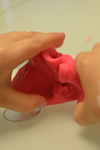 As much as motherhood has taken away — time to write, the ability to practice the piano without little hands taking over the keyboard ("Scooch, Mama”), the mental acuity to use polysyllabic words (or, some days, to finish sentences) — it has given me more. I have not lost myself in motherhood, as I had feared, but discovered myself. I don't just mean I've realized the beauty and joy of being a mother, but in and through motherhood I've grasped new ways of being creative. I learn creativity from my children, who are infinitely the same as and different from me; I learn creativity through my desire to create for them; I learn creativity simply by opening myself up to being something else.
As much as motherhood has taken away — time to write, the ability to practice the piano without little hands taking over the keyboard ("Scooch, Mama”), the mental acuity to use polysyllabic words (or, some days, to finish sentences) — it has given me more. I have not lost myself in motherhood, as I had feared, but discovered myself. I don't just mean I've realized the beauty and joy of being a mother, but in and through motherhood I've grasped new ways of being creative. I learn creativity from my children, who are infinitely the same as and different from me; I learn creativity through my desire to create for them; I learn creativity simply by opening myself up to being something else.
Repairing the World
Even with the best hopes, the truest motives, we will get hurt, because the world is very messy. Stepping in, even with responsibility born of love, is never neat-and-clean. To take up the wounds of the world will wound us, as it did God himself — which is why the heart of our vocation must be the imitation of the vocation of God. Nothing else can so form us, nothing else can so sustain us.
 For me, the empty pages tell the story of my life becoming occupied with things I never suspected would lead me from the corner booth at the coffee shop into the consuming risk and mess and joy and inertia of marrying a woman who beckons me out of isolation, of raising four beautiful and uniquely complex children, of moving from one city to another, of living in a community, and of following a vocation which, ironically, involves more writing than ever.
For me, the empty pages tell the story of my life becoming occupied with things I never suspected would lead me from the corner booth at the coffee shop into the consuming risk and mess and joy and inertia of marrying a woman who beckons me out of isolation, of raising four beautiful and uniquely complex children, of moving from one city to another, of living in a community, and of following a vocation which, ironically, involves more writing than ever.
 My experience has been that I mistake seasons of “creative dryness” for a season in which it is time to make something else. So, rather than simply waiting for the next moment of inspiration or the next deadline to move you into creative work, move yourself out of your normal discipline and do some painting, drawing, shooting, playing, etc. After all, you are a creature who creates — that is the core of who you are. What you make is secondary.
My experience has been that I mistake seasons of “creative dryness” for a season in which it is time to make something else. So, rather than simply waiting for the next moment of inspiration or the next deadline to move you into creative work, move yourself out of your normal discipline and do some painting, drawing, shooting, playing, etc. After all, you are a creature who creates — that is the core of who you are. What you make is secondary.
Becoming a Songwriter, Part 3
Whether you believe you have a soul, a personality, or that you are a random blip in a succession of universes, within your person is the very you of you. I’m describing the you that is only you and no one else on the planet. You know you’re not me or your sister or brother. You are you. You have a mind and emotions that feel, think, and imagine. You have a body that has mobility and senses. You have a gender. You’re able to communicate in a number of ways — non-verbally through expressions, with language, with your whole body, and of course with music. Creativity, and specifically songwriting, ought to be the natural outworking of the whole person simply being what he or she is, human.
 My work is wrapped up in the self I knock against every ordinary day. It is in my home. It is there with me on vacation. It is in breathing and being; in worrying less and wondering more; in the act of loving (or cooking or cleaning or playing or resting), rather than in analyzing how well I’m doing it. Don’t get me wrong; my work is hard work (as is yours). But it is very simple. It is right in front of me.
My work is wrapped up in the self I knock against every ordinary day. It is in my home. It is there with me on vacation. It is in breathing and being; in worrying less and wondering more; in the act of loving (or cooking or cleaning or playing or resting), rather than in analyzing how well I’m doing it. Don’t get me wrong; my work is hard work (as is yours). But it is very simple. It is right in front of me.
Becoming a Songwriter, Part 2
The power of place cannot be underestimated. This is why artists leave one place and move to another. The new place likely comes with a story—a story that tells the artist, “If you want to be a songwriter, this is the place to do it. This is the place that others have done the very thing you want to do. This is a place rich in stories — it’s a history-making place.” When young songwriters tell me they are moving to Nashville, it’s not because of the Tennessee Titans or our famous meat and three cuisine.
Places, and the people that inhabit places, are never neutral in what they give birth to. People and place are meaning makers.
















